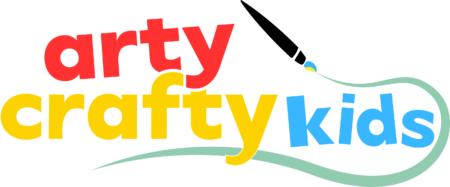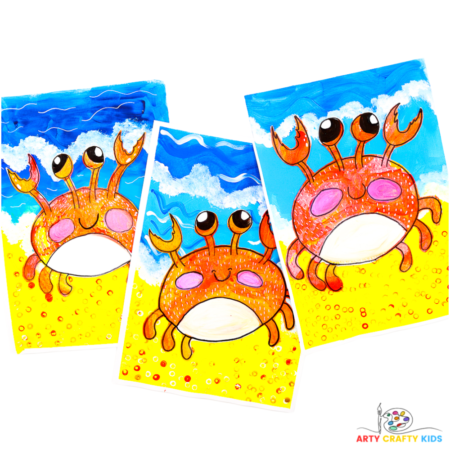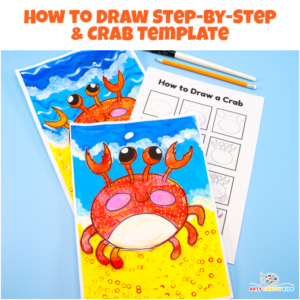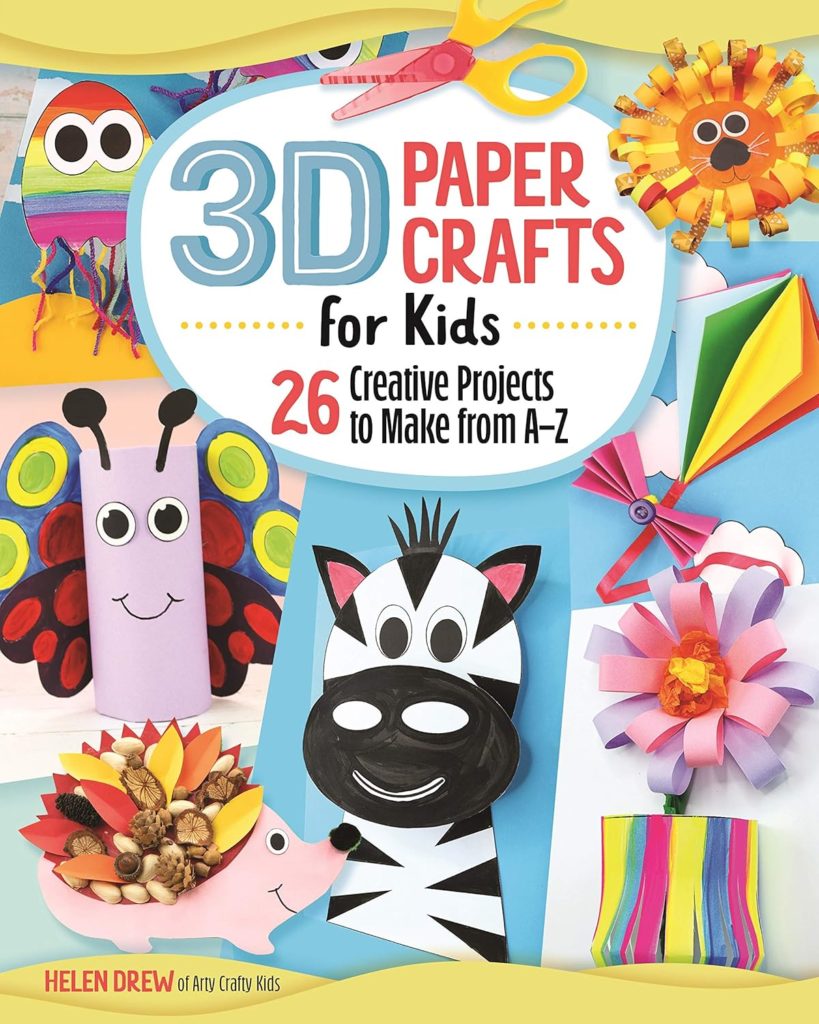Sharing is caring!
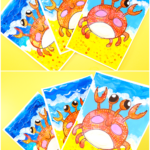
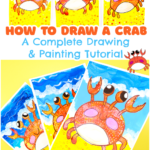

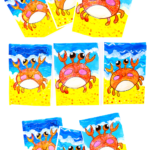
Our easy crab drawing tutorial provides a simple, step-by-step guide for Arty Crafty Kids and beginners to not only draw a crab but also transform it into a fun beach-themed Summer painting!
Drawing inspiration from the renowned illustrator and storyteller Eric Carle, our drawing tutorial employs the scrape painting technique to beautifully color the crab.
This method not only adds texture and depth to the artwork but also allows young artists to explore vibrant colors and creative techniques, capturing the energetic charm seen in Carle’s much-loved illustrations.
It’s a fun and engaging way to bring a touch of artistic magic to your crab-tastic painting!

The Flow Drawing Technique:
At Arty Crafty Kids, we love making art accessible and enjoyable for kids of all ages. Our flow drawing technique simplifies the process of drawing a crab, turning it into a fun and creative experience.
By breaking down the crab’s form into simple, flowing lines and shapes, we empower children to easily visualize and recreate their own unique crab designs.
This approach encourages artistic expression, allowing each child to add their personal touch and style to their crab drawing.
Whether it’s adding playful details to the claws or creating expressive eyes, our flow drawing method ensures that every child can confidently create their own crab artwork, making it a fulfilling artistic experience for young artists.
Easy Crab Drawing and Painting Tutorial for Kids
Materials:
- X2 White Cardstock
- Pencil
- Paint
- Scrap Cardstock
- Black Marker Pen
- White Acrylic Pen
- Paintbrush
- Bristly Paintbrush or Sponge
- Masking Tape
- Illustrated Crab Step-by-Step Guide and Template (members will need to log in to the Arty Crafty Kids members area to access the printable tutorial and template).
Not a Member?
Join the Arty Crafty Kids club to access the Crab Step-by-Step Illustration and Template, along with 1000’s more Art and Craft templates, How to Draw Guides, and Coloring Pages.

Part 1: Paint a Beach Scene
Before starting the beach scene, apply masking tape around the edges of the cardstock. This serves two purposes: it creates a beautiful border for the finished painting and helps to minimize excess paint mess.

Step 1: Divide the canvas into two sections: the sea and the other representing the sand.
Use a pencil to draw a wavy line across the cardstock, then draw another one higher up on the sheet.
Next, paint the lower half of the canvas yellow.
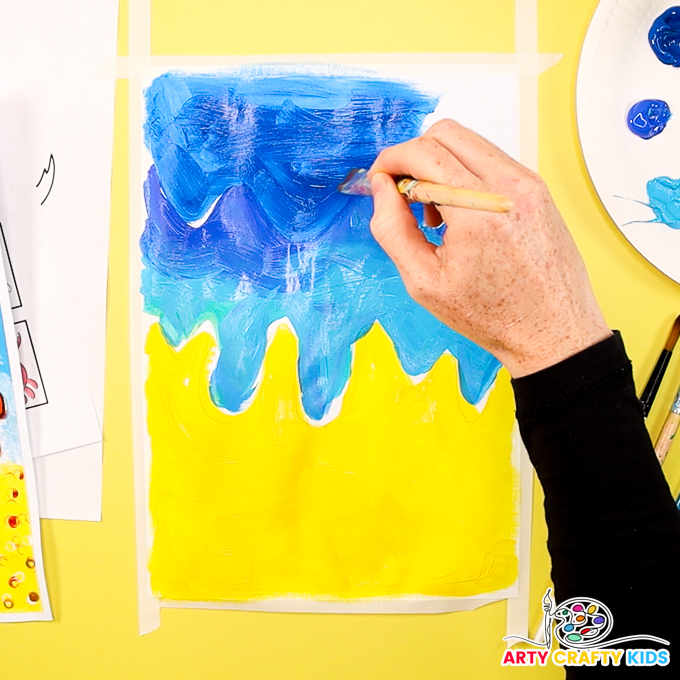
Next, paint the upper half of the cardstock canvas blue.
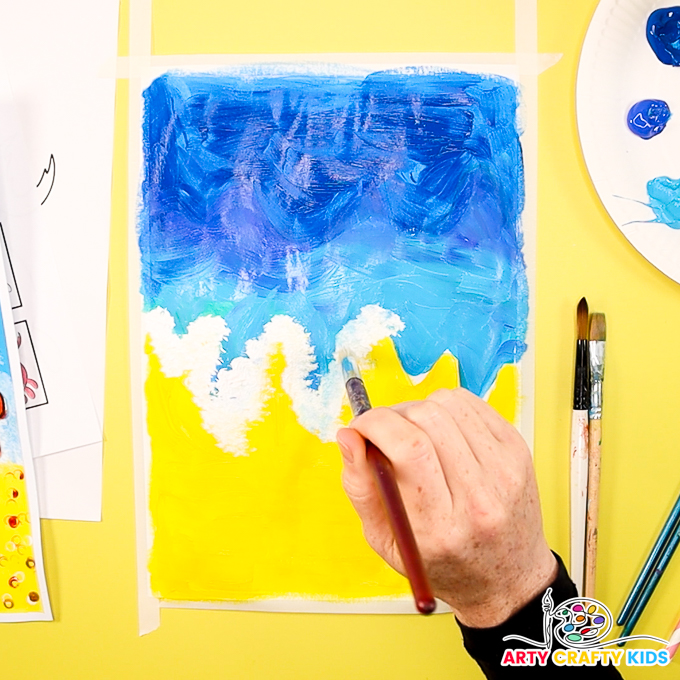
Step 2: Use a bristly brush to paint waves.
To create the impression of crashing waves on the shoreline, dip a bristly brush into white paint and dab along the wavy line where the sand meets the sea.
Repeat this technique further up the canvas to emphasize the waves rolling onto the shore.
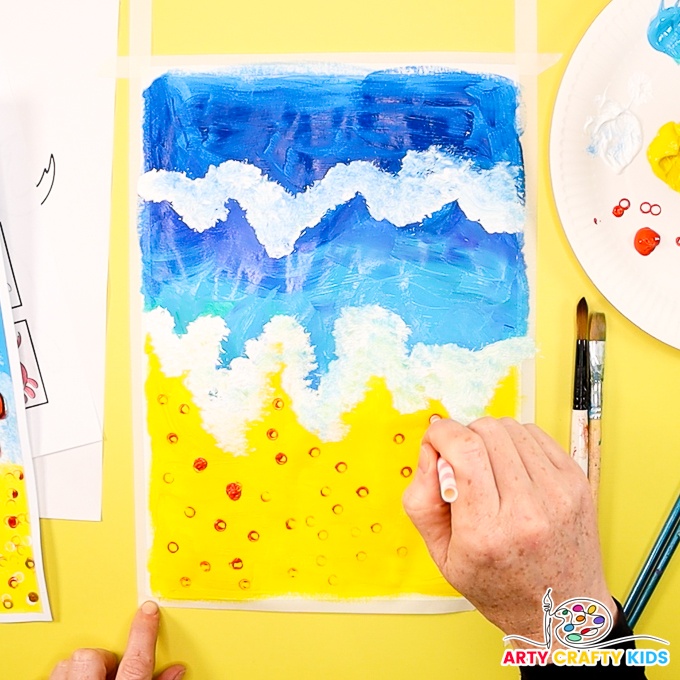
Step 3: Use a straw to print spots on the sand.
Dip a paper straw into orange or yellow paint and print a series of spots across the sand to add texture and visual interest.
This is a fun way for Arty Crafty Kids to experiment with different painting techniques!
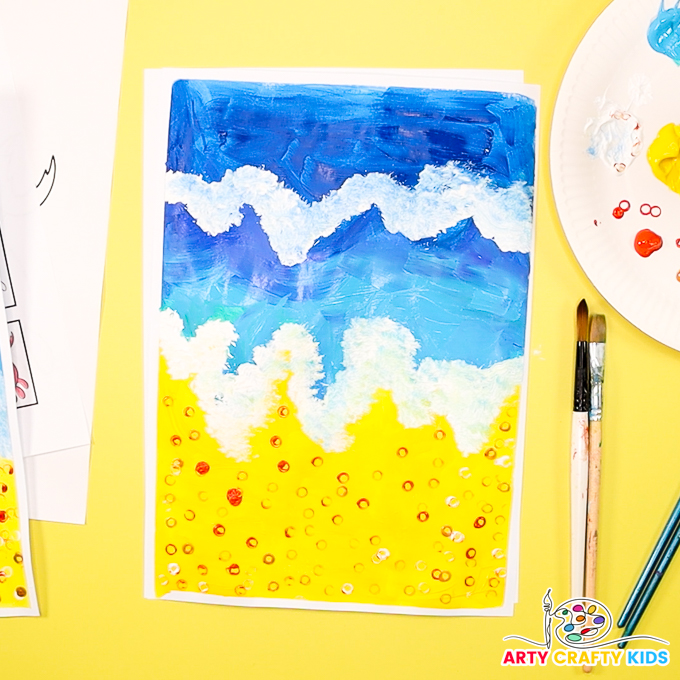
Once your Arty Crafty Kids have finished painting, let it dry and move on to drawing a crab!
After the sand and sea background is completely dry, carefully peel away the tape.
Part 2: How to Draw a Crab
You can download a detailed step-by-step crab drawing tutorial from the Arty Crafty Kids membership area.
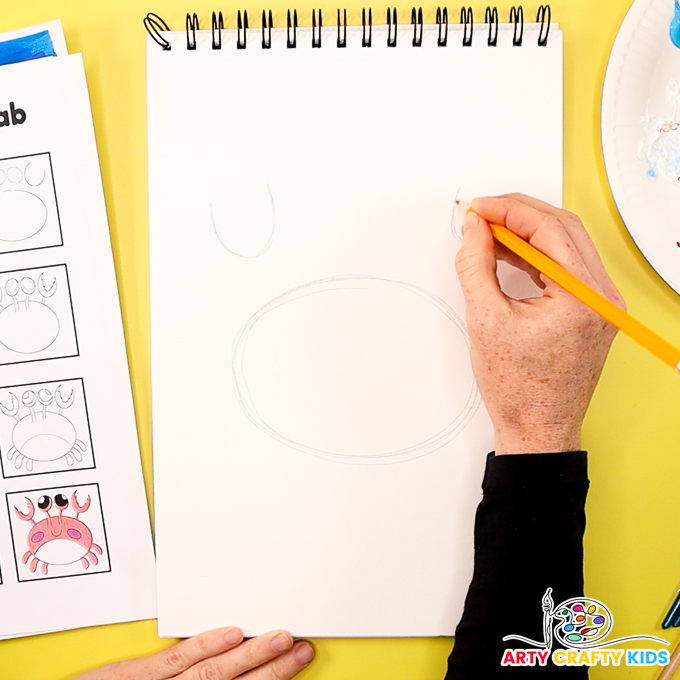
Step 1: Draw the crab’s body and claws.
Use a pencil to draw a large oval shape, repeatedly tracing over it to create a rhythmic flow, allowing the shape to naturally emerge.
Using the same technique, draw two upside-down arches on either side, just above the crab’s body.

Step 2: Define the claws and then draw a pair of eyes positioned between them.
Add simple jagged detailing to each claw. Draw a pair of circles for the crab’s eyes and then add pupils to define them.
Next, draw connecting lines from both claws and eyes to the crab’s body.
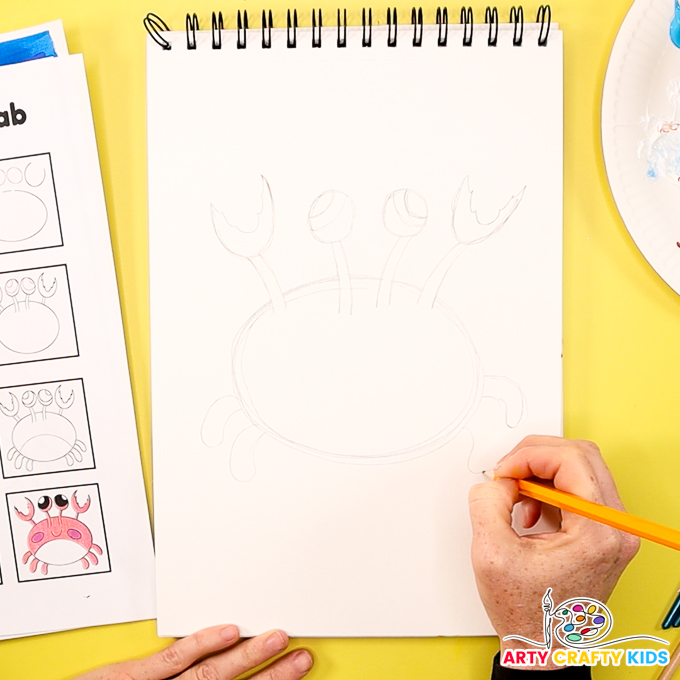
Step 3: Draw the crab’s legs.
Draw three legs extending from each side of the crab’s body.

Step 4: Draw a cute smile and a pair of cheeks.
Give the crab a friendly cartoon feel by drawing a cute little smile and two ovals for cheeks.
Part 3: How to Paint the Crab
Our crab is painted with the scrape painting technique. This method allows children to experiment with colors and textures while achieving a playful and artistic result, akin to the style seen in Eric Carle’s beloved picture books.
More Art Ideas Using the Scrape Painting Technique >>> Shark Art, Winter Bird Art, Andy Warhol Flower Art.
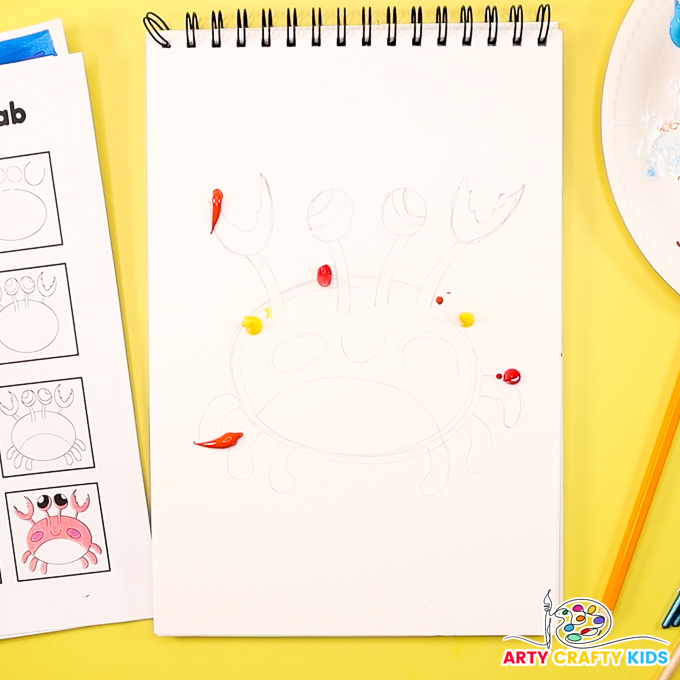
Step 1: Apply yellow, orange, and red paint around the crab drawing.
Choose bright colors typically used in Eric Carle’s illustrations, like red, orange, and yellow. Apply blobs or lines of these colors around and inside the crab outline.
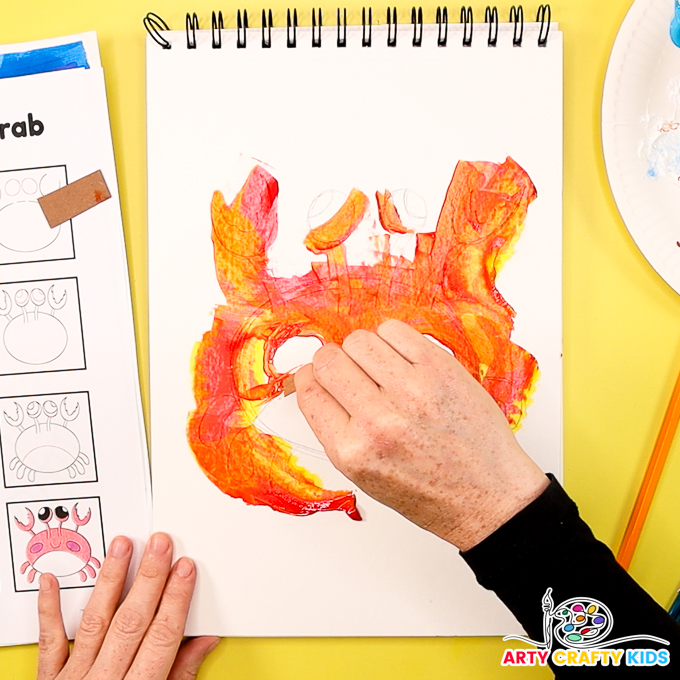
Step 2: Scrape the paint across the crab drawing.
Use small pieces of scrap cardstock to gently scrape the paint across the crab, leaving the cheeks, stomach, and eyes exposed.
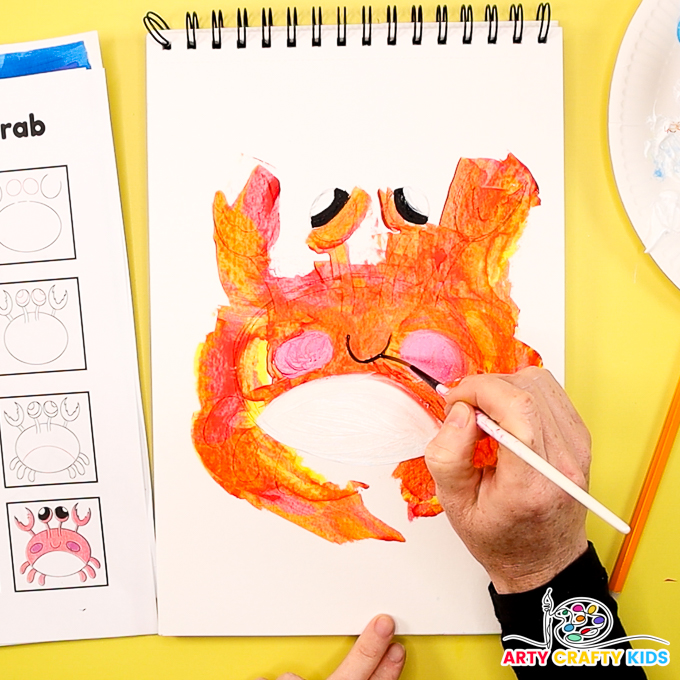
Step 3: Use a paintbrush to add detailing.
Dip a paintbrush into black paint and draw a smile, then fill in the eyes.
Next, add white to the crab’s stomach area, pink to the cheeks, and white to the large pupils.

Step 4: Outline the crab with a black marker pen.
Once the crab has thoroughly dried, outline the crab with a black marker pen.
Part 4: Completing the Crab Art Project

Step 1: Carefully cut out the crab.
Don’t worry about cutting precisely along the lines. For little hands, simply cut around the crab shape, leaving a small border. This adds to the charm of the completed art project.

Step 2: Draw some final detailing on the crab’s body.
Use a white acrylic marker pen to draw a series of dashed lines on the crab’s body.
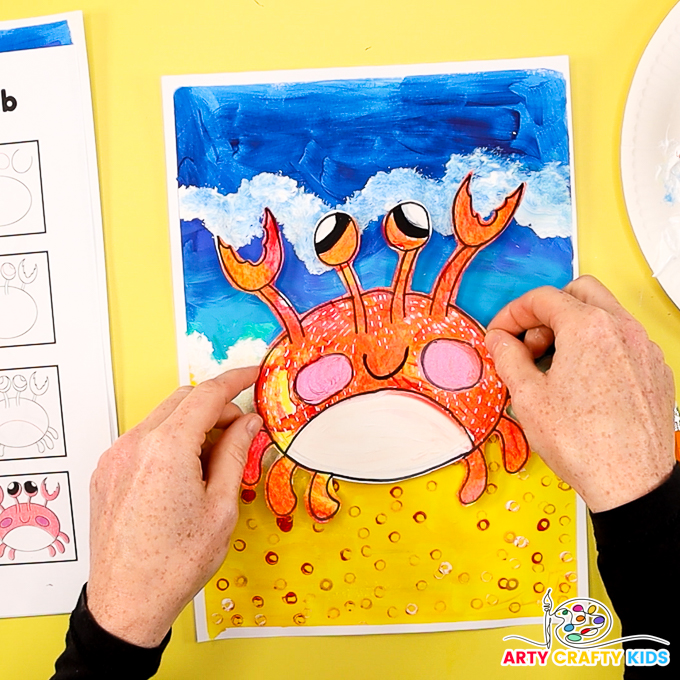
Step 3: Stick the crab onto the sand and sea painting.
The easy crab drawing and painting tutorial is complete!
With step-by-step guidance, Arty Crafty Kids have not only mastered drawing the crab with ease but have also brought it to life through vibrant colors and imaginative details.
More Crab Crafts for Kids >>>> Rocking Crab Craft, Paper Plate Crab, and Woven Crab Craft.
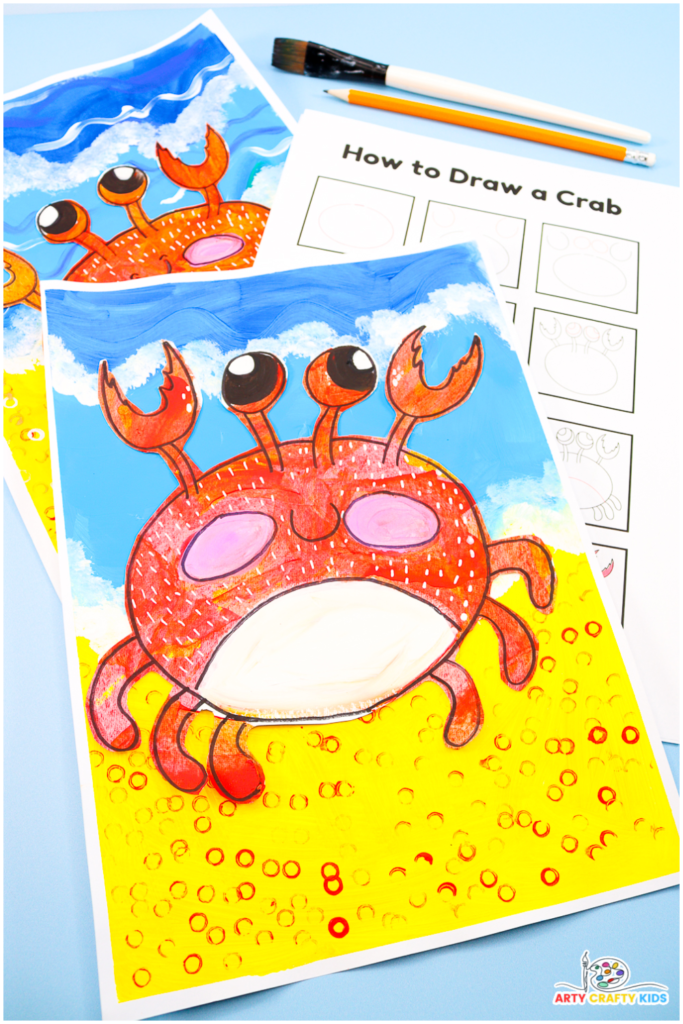
Crabs for the Classroom!
Imagine how a vibrant classroom display could look with our easy crab drawing and painting tutorial, with rows of colorful crabs, each unique in shape, size, and expression.
This tutorial offers versatility and invites students to explore different mediums. Some may opt for bold acrylics to make their crabs pop, while others might choose delicate watercolors for a softer, more nuanced effect.
Children can dip into their creativity by using crayons, markers, or even collage materials (like Eric Carle’s Tissue Paper Collage Technique) to personalize their artwork.
This showcase will be sure to celebrate each student’s individual style and artistic expression.
